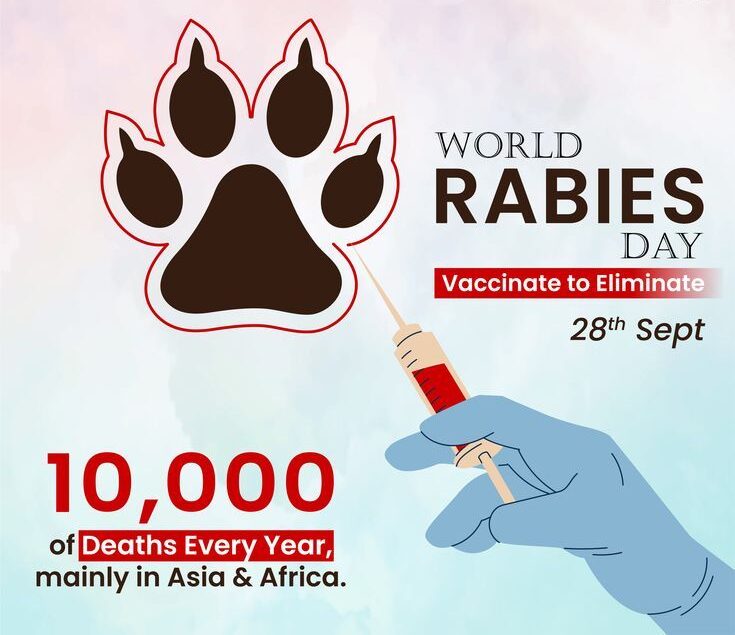🐾 5 Alarming Realities That Make World Rabies Day a Life-Saving Reminder
🧬 Introduction: Why World Rabies Day Matters
In an age where science and medicine have advanced dramatically, it’s heartbreaking that rabies—a 100% preventable disease—still claims over 59,000 lives every year, most of them in Asia and Africa. World Rabies Day, observed every year on September 28, is not just another awareness event—it’s a critical global movement that pushes for action, education, vaccination, and compassion.
- 🧬 Introduction: Why World Rabies Day Matters
- 📜 History of World Rabies Day
- ⏳ Timeline of Major Events
- 🧠 5 Alarming Rabies Facts You Should Know
- ❓ Frequently Asked Questions (FAQs)
- Q1: What is rabies?
- Q2: How does rabies spread?
- Q3: Can rabies be prevented?
- Q4: Is rabies curable after symptoms appear?
- Q5: Why is World Rabies Day important?
- 🌍 Global Significance of World Rabies Day
- 🌐 Observance Around the World
- 🎉 Heartfelt Wishing Messages for World Rabies Day
- 📌 Important Points to Remember
- 🏠 Importance in Our Life
- 🔄 Daily Life Impacts of World Rabies Day
- 🤝 Conclusion: A Small Step That Saves Lives
Organized by Global Alliance for Rabies Control (GARC) and supported by the World Health Organization (WHO) and World Organisation for Animal Health (OIE), this day unites governments, healthcare professionals, animal rights activists, and ordinary citizens to work towards eliminating rabies globally by 2030.
📜 History of World Rabies Day
📅 Origin and Purpose
World Rabies Day was established in 2007 by the Global Alliance for Rabies Control (GARC).
The date, September 28, was chosen to commemorate the death anniversary of Louis Pasteur, the French scientist who developed the first successful rabies vaccine.
Its purpose is to:
Raise awareness about rabies prevention.
Promote dog vaccination.
Educate communities, especially in rural and underdeveloped regions.
Push for policy advocacy and funding.
⏳ Timeline of Major Events
| Year | Event |
|---|---|
| 1885 | Louis Pasteur develops first rabies vaccine |
| 2007 | First World Rabies Day observed |
| 2015 | WHO sets the goal to end human rabies deaths by 2030 |
| 2020 | Global Strategic Plan introduced (by WHO, FAO, OIE, and GARC) |
| 2023 | Over 180 countries participate in awareness events |
🧠 5 Alarming Rabies Facts You Should Know
🩸 Rabies is almost always fatal once symptoms appear—but it is 100% preventable with prompt care.
🐕 Over 99% of human rabies cases are caused by dog bites.
🧒 Children under 15 account for 40% of rabies victims, especially in rural areas.
💉 Post-Exposure Prophylaxis (PEP) can save lives but is not always available or affordable in many countries.
🌍 Rabies exists on every continent except Antarctica, with the highest death toll in India and sub-Saharan Africa.
❓ Frequently Asked Questions (FAQs)
Q1: What is rabies?
Rabies is a viral disease that affects the central nervous system. Once symptoms appear, it is almost always fatal.
Q2: How does rabies spread?
Primarily through the bite or scratch of an infected animal, most commonly dogs.
Q3: Can rabies be prevented?
Yes. Vaccinating animals, quick wound cleaning, and post-exposure prophylaxis (PEP) are key preventive measures.
Q4: Is rabies curable after symptoms appear?
No. Once symptoms begin, death is nearly inevitable. That’s why prevention is critical.
Q5: Why is World Rabies Day important?
It educates, prevents deaths, promotes animal welfare, and pushes the global community towards the Zero by 30 goal.
🌍 Global Significance of World Rabies Day
🎯 Global Health Impact
Rabies primarily affects low-income communities, especially in rural areas with poor healthcare access. By eliminating rabies, we can save thousands of lives, reduce the burden on health systems, and improve animal welfare.
🧪 Scientific Breakthroughs
World Rabies Day also honors scientific progress in vaccine development, diagnostics, and policy-making.
🐕🦺 One Health Approach
The day emphasizes the One Health approach—an interconnected view that human health, animal health, and environmental health are all linked.
🌐 Observance Around the World
India: Awareness drives in schools, free dog vaccination camps, local government webinars.
Africa: WHO and local NGOs collaborate on mass dog vaccination.
USA & Europe: Animal rights groups educate pet owners about regular vaccinations.
Online: Hashtag campaigns like #EndRabiesNow and #WorldRabiesDay trend globally.
🎉 Heartfelt Wishing Messages for World Rabies Day
🐶 “Protect our furry friends and our families—get vaccinated. Happy World Rabies Day!”
💉 “Every life matters. A shot today can save a life tomorrow.”
🌎 “Let’s unite for a rabies-free world. Awareness is the first vaccine.”
❤️ “Your kindness to animals is a shield for your community. Observe World Rabies Day with care.”
📌 Important Points to Remember
| Point | Detail |
|---|---|
| First Observed | 2007 |
| Organized by | GARC, WHO, FAO, OIE |
| Global Deaths | ~59,000 per year |
| Primary Cause | Dog bites |
| Prevention | Vaccination, wound care, PEP |
| Goal | Zero human deaths from dog-mediated rabies by 2030 |
🏠 Importance in Our Life
🧒 For Families
Knowing about rabies keeps children safe during outdoor play with animals.
👨⚕️ For Healthcare Professionals
Encourages them to recognize symptoms early and promote vaccination drives.
🐾 For Pet Owners
Promotes responsible pet ownership, including routine vaccinations.
🏡 For Communities
Preventing rabies helps build trust between humans and animals, improves public health, and saves resources.
🔄 Daily Life Impacts of World Rabies Day
Boosts community health programs through awareness.
Inspires youth to take up roles in veterinary and public health fields.
Encourages animal compassion in schools and homes.
Reduces fear and misinformation about dogs and stray animals.
Promotes collaboration between doctors, vets, and local authorities.
🤝 Conclusion: A Small Step That Saves Lives
World Rabies Day isn’t just for governments or health professionals—it’s for every pet owner, parent, teacher, student, and citizen. Rabies is one of the few deadly diseases we can eliminate with simple, cost-effective, and proven solutions.
So let’s take that one small step—whether it’s vaccinating a pet, sharing a poster, educating a neighbor, or supporting a local campaign—because your action today might save a life tomorrow.
Together, we can make “Zero by 30” not just a slogan, but a reality.









I’m still learning from you, as I’m making my way to the top as well. I definitely love reading all that is written on your site.Keep the aarticles coming. I loved it!